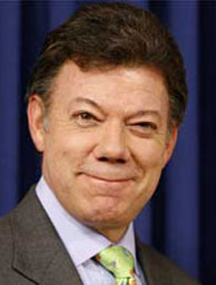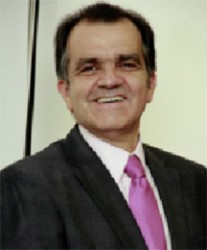BOGOTA, (Reuters) – Colombians pick a new president on Sunday in a tight runoff election fought over whether peace talks with leftist guerrillas or a renewed military offensive stand the best chance of ending 50 years of war in the Andean country.

President Juan Manuel Santos and right-wing challenger Oscar Ivan Zuluaga, both market-friendly former finance ministers, have divided the electorate over their different approaches to ending a conflict that has killed around 220,000 people since 1964.

It is Colombia’s tightest election in decades. One of three polls published late last week put the candidates in a dead heat, while the other two gave a firm lead to one or the other.
“In this election we will choose how we will reach peace. Through dialogue or fighting,” said Ingrid Barrero, 34, a Bogota accountant who plans to vote for Zuluaga.
Santos, who hails from one of Colombia’s handful of aristocratic families, says the negotiations he began with the rebel leaders of the Revolutionary Armed Forces of Colombia (FARC) in 2012 offer a genuine chance of peace.
Despite significant progress in talks and efforts to begin others with the FARC’s smaller counterpart, the ELN, Zuluaga has won over a large swath of the electorate who doubt the rebels will disarm and walk away from a lucrative cocaine trade even if a deal is signed.
Zuluaga has said he would continue the peace talks but that guerrillas must declare a unilateral cease-fire if discussions are to continue. FARC leaders have rejected that, raising the chances that a Zuluaga victory would lead to a breakdown in talks and an escalation of the war.
PROXY PRESIDENT?
Santos entered the race with a comfortable lead, but Zuluaga surged from third place and won most votes in the first round last month by inheriting some of the immense popularity of his party’s leader, former President Alvaro Uribe.
Santos has suggested Zuluaga would merely be Uribe’s puppet.
Uribe significantly weakened the FARC during his 2002-2010 presidency with the help of the United States, wresting large swaths of the country back from rebel control.
The tight election race has grown increasingly bitter with corruption allegations surfacing against the candidates. Both deny any wrongdoing.
If Santos wins, his government must reach agreement with the FARC on the final two points of a five-point talks agenda: reparations for war victims and steps to end conflict. Any deal would be put to a referendum.
A Zuluaga victory will raise questions about how far he will go to keep the talks alive and, if they end, whether the military can root out the remaining hard core of more experienced FARC fighters.
“It’s the first time we’ve ever come this far in negotiations,” said 45-year-old lawyer Maria Vazquez in Bogota. “I’m voting for Santos, not because I love him, but because of the peace process.




